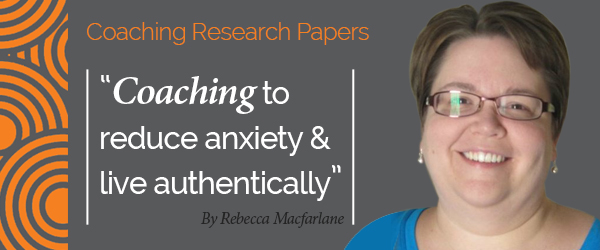 Research Paper By Rebecca Macfarlane
Research Paper By Rebecca Macfarlane
(Professional Coaching, United States)
Abstract
Modern lives in the 21st century are filled with stresses that are unlike those experienced by humans of the past. Technology, the pace of life, and pressures to live in accordance with marketing messages all produce feelings of stress, which the body reacts to physically. The prevalence of anxiety disorders is high across the world, and the effectiveness of traditional treatments involving psychoactive drugs and “talk therapy” are being questioned by psychologists and medical doctors alike.
In the last 5 years, mindfulness and authentically living in accordance with personal values are becoming popular alternatives to treating anxiety disorders. More empirical research is needed, but early research has concluded that life coaching can be an effective treatment in helping clients learn these new behaviors, habits, and skills needed to live more mindfully, thus ridding themselves of the physical and psychological symptoms of anxiety disorders.
Introduction
According to recent studies by the National Institute of Mental Health, more than a quarter of the adult population in the US will either suffer from or be diagnosed with some form of anxiety disorder some time in their lives (Kessler, Chiu, Demler, Walters, 2005). Figures across the globe are similar with the World Health Organization report in 2006 that the prevalence of anxiety disorders are around 16% of the world’s population (Andrews, Sanderson, Slade, Issakidis, 2000). These figures are set to rise as economic downturns, international conflicts, and modern living all take their toll on mental health.
Since the mid-1980s, when many popular types of drugs to treat anxiety came onto the market, doctors have been moving away from treating patients suffering from anxiety disorders with talk-therapy and relying more and more on drugs alone to correct the chemical imbalances thought to cause the disorder. The rate of remission for those that are treated for anxiety with traditional drug-and-talk therapies is relatively low, suggesting that they either a) are not administered correctly or b) do not work long term (Andrews et al., 2000).
Over the last 5-10 years, treatment methods for anxiety disorders are beginning to change. There is a movement in the field of anxiety treatment towards more authentic, mindful living, which often is a more effective, long-term treatment for many patients.